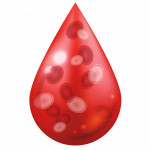People with HIV and hepatitis C virus (HCV) and who achieve undetectable HCV levels after only four weeks of HCV treatment may be able to clear HCV after only 24 weeks of treatment, according to a study published April 15 in Clinical Infectious Diseases.
Studies have consistently demonstrated that a rapid response to HCV treatment in people who are infected only with HCV strongly predicts whether a person will have what is known as a sustained virologic response (SVR). An SVR is when a person’s HCV levels remain undetectable for at least six months after completing a course of HCV treatment. Researchers have begun to decide how long a person with HCV needs to remain on treatment, based on his or her early treatment response.
It has been less clear, however, whether a rapid early response would be as predictive in people coinfected with both HIV and HCV. HCV is usually treated for at least 12 months in people living with both viruses.
Eva Van den Eynde, MD, and her colleagues from the Autonomous University in Barcelona, Spain, tested the predictive value of a rapid HCV treatment response in 60 coinfected patients in their clinic. Twenty-four patients were infected with the easier-to-treat HCV genotype 3, while 36 were infected with the harder-to-treat genotypes 1 and 4, the most common HCV types among HIV-positive people in the United States. The duration of HCV treatment was guided by the patients’ HCV levels at weeks 4 and 12. People who had undetectable HCV levels at week 4 were treated for 24 weeks. People who were detectable at week 4 but undetectable at week 12 were treated for 48 weeks, and people who were detectable at both weeks 4 and 12 were treated for 60 weeks.
Roughly one third of the patients were undetectable at week 4 and were thus treated for only 24 weeks. Most of them were infected with HCV genotype 3. Though the overall number of patients with genotype 1 or 4 in this group was small, all of them ended up having an SVR after 24 weeks of treatment. Among those with genotype 3, a total of 85 percent had an SVR.
SVR rates were significantly lower in people who had detectable HCV levels at 4 weeks but undetectable HCV levels at 12 weeks—and who were therefore treated for 48 weeks. Despite having undetectable HCV levels at week 12 and at the completion of 48 weeks of treatment, almost half of the patients with genotypes 1 or 4 failed to have an SVR.
Overall, SVR rates in all of the groups were higher in people with lower HCV levels before starting therapy and, not surprisingly, those infected with HCV genotype 3. The authors, however, state that using HCV levels at week 4 to guide treatment duration is feasible in people coinfected with both HIV and HCV, regardless of HCV genotype.
Advertisement
Advertisement
Advertisement





2 Comments
2 Comments